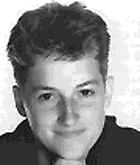|
4.48 Psychosis in UK
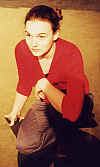
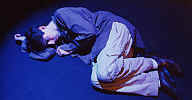
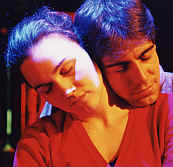
4.48 Psychosis was
performed as a postgraduate director's course drama
school production with 2 professional actors (one male,
one female). It was on at the Mountview Academy's Judi
Dench Theatre, London on 10-11 May 2002.
The director is Adam
Barnard and the actors are Mark Farrelly and Caroline
McKeating. Music by Peter Michaels.
| The original intention of
director Adam Barnard was "The theatre is a
black box with no seats - the audience move
around from one part to another, as if at a
gallery viewing installation work. Their
movements are sometimes be controlled through
cordoning off area and creating spaces within the
space" but "... the
course of rehearsal altered every aspect of the
production. The actors don't move about an open
space and we didn´t cordon off the audience and
make inset spaces or any such glamorous stuff,
simply because it didn't work. We found that the
text wanted a tangible divide between performance
space and audience space. Definition of who what
where etc is turbulent enough as it is, and I
think clear demarcation between audience and
performer is actually very important, as are
distinctions of light and dark. The play must
talk to the audience and make them witnesses, but
it must never implicate them. We found it best to
treat the audience as the only people, apart from
the 'characters', who understood what Dr This and
Dr That were really like, who had a hope of, if
not feeling, at least understanding, the
psychosis.
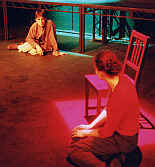 |
What
can I say about it? We used two actors
(Mark Farrelly and Caroline McKeating)
who could become aware of each other in
the space and sometimes, however
fleetingly, interact. The
setting was simple and largely black - a
raised ledge at the back which actors
stood on, lay on or hid under, a single
chair, a filing cabinet, two torches that
stayed on inside the cabinet giving it an
unearthly glow, a dictaphone, a notepad,
some chalk to write on the walls. They
were two characters going through
separate journeys who took turns to play
the doctor or lover so the other could
show the audience their predicament. By
the end, people said, the two began to
seem two fragments of one persona.
Between sections the actors shared more
abstract movement reflecting an
intangible complicite with each other.
|
Lights
(by Stuart Crohill) provided simple, strong pools
of colour which ebbed away to stark white by the
end. Music (by Peter Michaels) was more a
soundscape of noise and effect than anything with
a humable tune".
Thanks to Adam for the photos
and the text.
|
Crave and 4.48 Psychosis premiere in
Turkey
Suffering
(Kývranýþ) was a two play project: Crave (Tutku) and
4.48 Psychosis (Psikoz 4.48) . It was performed by
a Turkish group as part of the 13th International
Istanbul Theatre Festival. The actors were
Payidar Tufekcioglu, Esra Bilgin, Emrah Elciboga and
Derya Alabora and the director was Emre
Koyuncuoðlu. Crave premiered on 23 May, and 4.48
Psychosis on 24 May 2002.
Crave in
Canada
 |
Crave in
Toronto, Canada from 23 May to 1 Jun 2002.
It was produced by the Graduate Centre for Study
of Drama at the University of Toronto. |
 |
Directed
by Sam Stedman, with Michael Devine (A), Kevin
Rees-Cummings (B), Kelly Rico (M) and Tamila Zaslavsky
(C).
| Dramaturg |
Joanna Falck |
Assistant
Director |
Eszter
Jagica |
| Movement
Coach |
Elena
Kaufman |
Set Designer |
Kessa Laxton |
| Assistant Set
Designer |
Claudia Kada |
Lighting
Designer |
Scott Hill |
| Costume
Designer |
Jennie Green |
Projection
Designer |
Bruce Barton |
| Production
Manager |
Vanita
Butrsingkorn |
Stage Manager |
Devin Upham |
| Assistant
Stage Manager |
Natalie
Papoutsis |
|
|
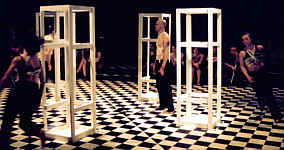
| "The
audience entered into the rectangular studio
space after being instructed that they were free
to explore the space throughout the show and that
sitting down was to be avoided unless necessary.
The space was divided into two halves by a
diagonally positioned scrim (with enough room on
each end for people to cross the scrimline), onto
which was projected images and fragments of the
text (via 4 slide projectors). Unfortunately, the
resources at our disposal did not entirely fulfil
the initial concept, which was that the scrim
would be opaque for a large portion of the show,
thus frustrating the audience's attempts to
visually apprehend everything at once (Kane never
struck me as a big fan of Aristotelian
perspicuity...). Due to
the short throw distance from the projectors to
the scrim, we had to get enormous lenses for the
projectors that diffused the light such that the
scrim took on a ghostly translucence. On each
side of the scrim was a bed structure.
One side of the scrim was
occupied by A&C, the other by B&M. The
blocking on each side often paralleled that of
the other side, with sharp breaks in this
parallelism to emphasize particular moments.
There was also a microphone and a dictaphone on
each side of the scrim, the former used for the
longer pieces of exposition (prior to A's long
monologue), which were played in various
personae. This first third of the text (the
monologue and short screams divide the text into
almost perfect thirds) was both the most
realistic and the most divided. The actors did
not physically transgress the border marked by
the scrim in this section, but sometimes
ambiguously communicated through the scrim, and
sometimes spoke to individual audience members.
During A's monologue the projections were faded
out and a video of the actor playing A was
projected as the real actor emphatically
delivered the monologue on the microphone,
competing with a pre-recorded version of the
monologue spoken with a deadpan voice played by C
on the dictaphone, which she held up to the
scrim, while B held the other microphone up to
the other side of the scrim, thus amplifying the
recording.
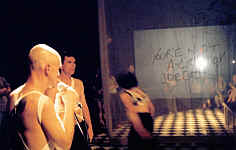 |
Immediately after A's
monologue the energy changed. C went
immediately to the microphone and
delivered her next line, "It's
getting worse," in a deadpan
fashion, while A crossed the scrimline to
join B&M. This middle third of text
consisted of deadpan lines delivered on
the microphone juxtaposed against the
strong emotions of the actors not on
microphone (i.e. A's "HOW CAN YOU
LEAVE ME LIKE THIS"), generating a
rather disconcerting effect. |
This
section included a number of scrim crossings (the
first step toward the breakdown of the
metaphorical spatial divisions of the stage).
Shortly before the short screams, the actors
chaotically deconstructed the beds, which
transformed into four compartments that they
erected. The screams, and the yes and no sequence
that precedes it, were performed from inside
these compartments as the scrim was slowly raised
up.
The final third of the text was
performed primarily as a monologue divided into
four voices (although not exclusively). The
blocking of this section was mostly symmetrical
and completely anti-realistic. The final image
involved each of the actors perched inside their
compartments, completely isolated, with an
anaesthetized numbness about them, after about 30
seconds of which a loop was played on the
dictaphone which became increasingly distorted.
After another 30 seconds, the doors were opened
and the audience eventually filed out of the
space. The interesting thing was the audience
response. The usual response was applause,
although it always took one brave person to lead
the rest, since there was no conventional curtain
call. But on a few nights, the audience didn't
applaud, but rather circled the compartments like
vultures, naturally forming two circles, one
moving clockwise, the other counter-clockwise (it
looked choreographed!). On another night, the
audience laughed - but not a normal laugh (I
simply can't describe it) - that was by far the
strangest response.
On the whole, it was a somewhat cold and
alienating experience for the audience (or so
I've been told), yet some spectators were deeply
moved within the context of that alienation. My
favourite response was from my aunt Laura:
"Sam, it was like being held down and forced
to drink a bottle of drain cleaner." Then
she promptly thanked me for the experience."
Thanks to Sam for the text and
the photos. More photos are in the photos
section.
|
Crave in London
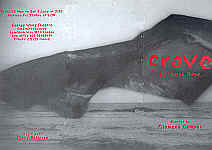 |
A production of Crave at
Goldsmiths College, London 30, 31 May and 1
June 2002.
The actors are Gabrielle Lurje (M), Gavin Molly
(B), Lindon Alexander (A) and Charlotte Hoare
(C). There are two musicians, Orphy
Robinson and Roger Goula. The director is
Filomena Campus.
|
| "An
original staging: the play opens with musician
Robinson playing guitar on the stage. Then
the actors, sitting scattered in the twilight
among the audience (arranged A, C, M, B)
speak. The closeness of the actors, part of
the audience, brings out the rhythm of Kane´s
work, each line picked up by another actor.
The music continues, sometimes
accentuating the emotion. When B says El
dinero viene solo the guitarist corrects the
accent. An African drummer joins the play,
the sounds from the wings "like rats feet
over broken glass" (T.S. Eliot). A
scene in total darkness works, because the
twilight has prepared the audience. And the
actors slowly make their way onto the stage.
M uses her hands in subtle ways -
the strands of the play accumulate - the audience
start to laugh at the jokes - the characters of
A, B, C and M begin to emerge - the sadness bites
- happy and free"
|
Cleansed in Norway
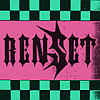 |
Cleansed
(Renset) performed by Den Nationale Scene, in
Bergen Norway. It was part of the
Festspillene i Bergen on 22-25 May 2002 and was
revived from 7 Sept- 19 Oct 2002. |
The
players are David Allen, Reny Marie
Gaasand Folgerø, Øyvind Gran, Petter Width Kristiansen,
Elisabeth Lahr, Kim Sørensen and Bjørnar Teigen with
Anders Paulin directing.
Crave in Singapore
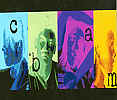 |
The Theatre
Studies Programme of the National University of
Singapore staged Crave, as part of the Late Nite
Series of the Singapore Arts Festival 2002
It was on
21-22 Jun 2002 at The Room Upstairs.
|
Cleansed
in California
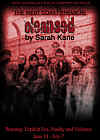 |
Cleansed
performed in The Empire Theatre, Santa Ana,
California from 14 Jun- 7 Jul 2002. The
West Coast premiere. Its by the Rude Guerrilla
Theater Company, and is directed by Dave Barton.
The cast are
Larissa Tidwell (Grace), Scott Caster (Graham),
Jay Fraley (Tinker), Scott Barber (Robin), Bryan
Jennings (Rod), Stephen Wagner (Carl) and Molly
Dewane (woman).
|
Site visitor Steve Omlid says (thanks
Steve)
| "... a superb production of
Cleansed (the play’s United States West
Coast premiere) now onstage in Orange County,
produced by the Rude Guerilla Theater Company.
Director Dave Barton (Rude Guerilla’s
artistic director) uses great theatrical
ingenuity to transcend his company’s modest
budget and solve the many staging challenges that
the play presents. But, even more importantly,
his production stays sharply focused on the
beauty behind the horror in the play. Barton and
his collaborators understand Kane, and they do
her honor.
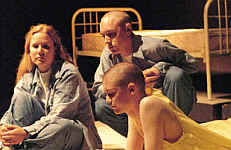
Cleansed takes place in a
somewhat oblique setting (Kane calls it “a
university”, but frankly, if I were in this
university, I’d want to be expelled) that
functions mainly as a torture house. It is
presided over by Tinker (played in the Rude
Guerilla production by Jay Fraley), a
self-described “doctor” (he wears a
white coat and everything) whose chief business
is to brutalize and even kill his
“patients”. These folks include Grace
(Larissa Tidwell), who shares an incestuous love
with the ghost of her brother Graham (Scott
Caster), a heroin addict who Tinker murders in
the play’s first scene with an intentional
overdose shot into his eye; Robin (Scott Barber),
a delicate boy who exchanges clothes with Grace
and then falls in love with her; and Rod and Carl
(Bryan Jennings and Stephen Wagner), a gay couple
who pay a horrible price for their relationship.
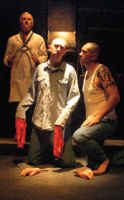
Tinker savages these folks
physically and mentally, but it becomes apparent
quite soon that he, too, is in terrible pain.
(One of the most powerful ideas in the play is
that brutality destroys the brutal as well as the
brutalized.) His scenes with a peep show dancer
(Molly Dewane) reveal that he is even needier
than his victims are. And Kane regards him with
just as much compassion, and gives him the same
capacity for redemption through love.
...Barton’s production of
Cleansed that really made me re-examine my
earlier take on Kane’s work. As arresting as
the stylized images of brutality are in this
production (a special nod should go to puppeteers
Peter Balgoyen and Katarina Yeo, who effectively
realize the aforementioned rats), I think what
I’m going to really remember are the gentler
moments, especially the three scenes of graphic
but exquisitely tender and intimate lovemaking.
(And yes, that’s what Kane calls it in her
stage directions, “making love”, not
“having sex” or “fucking”.)
As focused as the work by the uniformly
first-rate cast is throughout, and as fiercely
committed as they are to the violence and
ugliness in the play, it is undoubtedly in the
play’s most loving and beautiful moments
where their work is the bravest."
|
Premiere
of Crave in New Zealand
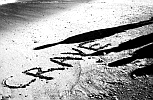 |
Crave had
its New Zealand premiere in Wellington from 4
July 2002.
The
players were Carey Smith, Eve Middleton, James
Stewart and Tina Helm, with direction by David
Lawrence, and presented by The Bacchanals.
|
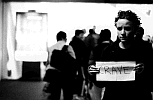 |
Phaedra's
Love in the USA
 |
Infernal
Bridegroom presented the regional premiere of
Phaedra's Love from 19 Sept 2002 in Houston,
Texas. |
The
director is Jason Nodler and Troy Schulze plays
Hippolytus and Tamarie Cooper plays Phaedra. Anthony
Barilla provides an original score.
Crave at
the Edinburgh Festival
Failbetter
Productions (formed from Warwick University theatre
graduates) performed Crave at the Edinburgh Fringe
Festival from 1-25 Aug 2002 at The Underbelly.
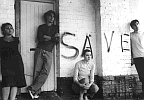 |
"one
of the most coherent texts about despair
in the modern world" |
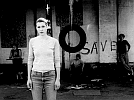 |
|
Site visitor
Ana says
(thanks Ana )
| "There were two
productions of Crave in Edi this year, and I saw
the one at the Underbelly (Warwick University
theatre graduates). For one thing, I
thought the actors were just too young - I know
it's not their fault, but I just couldn't buy
into a 20 year olds saying some of those lines (M
really wanting a child, for example). They
weren't *bad*, but they weren't exactly good
enough either. The four of them were facing the
audience, not really moving so in that sense not
completely dissimilar to the original production
(although two were at the front, C and B I
believe, and A and M were behind them). The
symbolism of the props - A holding a rosary - I
found somewhat heavy handed, ditto broken glass
in the middle of the stage.
I also had a feeling that the delivery was
teeny-weeny too quick. I know this play is about
language, and about rhythm and meaning through
rhythm and not about letting the audience to
dwell on every line for hours, still, I had a
feeling that everything was just that much too
fast. It didn't get one laugh for example - OK
that might have to do with the audience, but is
the Royal Court audience really that different?
Because every time I saw it at RC people would
laugh - there are some killer lines in Crave,
bleak humour Kane style... I think that's a
mistake for the director to disregard the humour,
and that's what they effectively did here: the
friends I saw it with (who were not familiar with
the text) said something along the lines 'we
noticed some of the lines were funny, but by the
time the humour would register, the moment would
be gone'."
|
Another
Crave at the Edinburgh Festival
Venue 13 also had
their version of Crave at the festival from 2-17 Aug.
Phaedra's
Love in Belgium
Theatre company De
Smedt performed Phaedra's Love in Kunstencentrum Nadine,
Elsene, Belgium from 30 Sept to 5 Oct 2002.
The players are Marij
De Nys, Hendrik De Smedt, Thibault Pringot and Eline
Kuppens, the tanslation is by Wim Lots and the director
is Matthias Dusesoi.
De
teksten van de Britse theaterauteur Sarah Kane,
op het eerste gezicht louter gewelddadige,
bloedige tijdsdocumenten, zorgden bij hun eerste
opvoering al meteen voor controverse, later nog
versterkt door de vroege zelfmoord
van de auteur. Nu de sensatie rond de persoon
Kane en haar werk wat geluwd is,
willen de jonge theatermakers van Tg. NUN de
tekst zelf laten spreken.
Phaedra’s Love is een tekst over iconen,
integriteit, liefde en de honger naar kicks.
Koningin Phaedra is stapelverliefd op haar
stiefzoon Hyppolytus en pleegt zelfmoord wanneer
hij haar afwijst. In Kane’s hedendaagse
versie van dit klassieke verhaal krijgt
Hippolytus’ levenshouding een centrale rol
toebedeeld. Dès leurs premières
représentations, les textes de la
dramaturge brittanique Sarah Kane, à première
vue des documents violents et sanglants
illustratifs d’une époque, étaient déjà
l’objet de controverses. Leur
renommée grandit encore après le suicide de
l’auteur. Maintenant que la sensation
autour de sa personne s’est un peu calmée,
les jeunes gens de théâtre
néerlandophone de Tg. NUN veulent donner la
parole au texte même.
Phaedra’s Love est une pièce qui parle
d’icones, d’intégrité, d’amour
et de la chasse aux stimulants. La reine Phèdre
brûle de passion pour son beau-fils Hyppolyte et
se tue quand il la rejette. Dans la
version contemporaine de Sarah Kane de cette
histoire classique, l’attitude
de Hyppolyte joue un rôle central.
|
Blasted
student production in London Crave at the Edinburgh
Festival
A student production
of Blasted at Goldsmith College, University of London,
from 23-25th Oct 2002.
|
